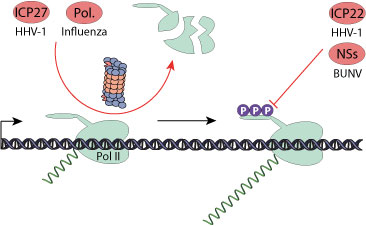Inhibition of host RNA polymerase II by virus (kw:KW-1104)
Host RNA polymerase II (RNA pol-II) is the major enzyme responsible for transcription of mRNA from a DNA template strand. It is made up of 12 subunits Rpb1 to Rpb12. Rpb1 is the largest and catalytical subunit of RNA polymerase II. The carboxy-terminal domain (CTD) of RNA pol-II plays a central role in regulating efficient transcription initiation, elongation and RNA processing. It contains 52 heptapeptide repeats (YSPTSPS) and is phosphorylated largely on Ser-2 and Ser-5 during transcription process.

Some viruses interfere with host RNA pol-II function. They may either mediate its ubiquitination and subsequent proteasomal degradation, or inhibit RNA pol-II phosphorylation thereby lowering its efficiency. Inhibiting host transcription eventually leads to shutoff of host proteins expression and gives viruses transcripts a competitive edge for access to the cellular translation machinery. Preventing the expression of host proteins is also a strategy to counteract the antiviral response.
Viruses inhibiting RNA pol-II:
| Family | Virus | Viral protein | RNA pol-II inhibition strategy | references |
| Herpesviridae | HHV-1 | ICP22 | Counteracts CTD Ser-2 phosphorylation |

|
| Bunyaviridae | Bunyamwera virus | NSs | Counteracts CTD Ser-2 phosphorylation |

|
| Orthomyxoviridae | Influenza virus | Polymerase PB1, PB2, PA | RNA pol-II ubiquitination and proteasomal degradation |

|
| Togaviridae | Sindbis, Semliki Forest and Chikungunya viruses | nsP2 | Ubiquitination of Rpb1 subunit and proteasomal degradation |

|
Matching UniProtKB/Swiss-Prot entries
(all links/actions below point to uniprot.org website)0 entry grouped by protein
